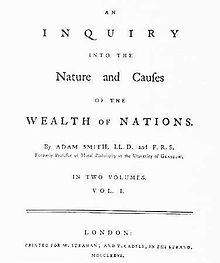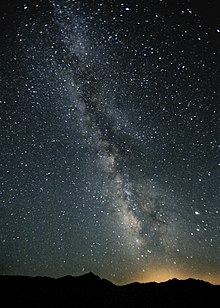Elias Canetti
Appearance

Elias Canetti (25 July 1905 – 14 August 1994) was a Bulgarian modernist novelist, playwright, memoirist, and non-fiction writer. He wrote in German and won the Nobel Prize in Literature in 1981.
| This article on an author is a stub. You can help out with Wikiquote by expanding it! |
Quotes
[edit]




- Alles, was man vergessen hat, schreit im Traum um Hilfe.
- Everything one has forgotten cries for help in the dream.
- Die Provinz des Menschen : Aufzeichnungen 1942–1972, München 1973, p. 269
Der Ohrenzeuge: Fünfzig Charaktere [Earwitness: Fifty Characters] 1974
[edit]- The blind man is not blind by birth, but he became blind with little effort. He has a camera, he takes it everywhere, and he just loves keeping his eyes closed. He walks about as though asleep, he has seen absolutely nothing as yet, and already he is shooting it, for when all things lie next to one another, equally small, equally large, always rectangular, orderly, cut off, named, numbered, proven and demonstrated, then you can see them much better in any event.
The blind man saves himself the trouble of viewing anything beforehand. He gathers the things he would have seen and piles them up and enjoys them as though they were stamps. He travels all over the world for the sake of his camera, nothing is far enough, shiny enough, strange enough—he gets it for the camera. He says: I was there, and he points to it, and if he could not point at it he would not know where he had been, the world is confusing, exotic, rich, who can retain it all.- “The Blind Man” J. Neugroshel, trans. (1979), p. 13
Das Geheimherz der Uhr [The Secret Heart of the Clock] (1987)
[edit]- I was never drawn to experiment with language; I take note of such experiments, but avoid them in my own writing. The reason is that the substance of life claims me completely. To indulge in linguistic experiments is to ignore the greater part of this substance, leaving all but a tiny portion untouched and unused, as if a musician were to ceaselessly play an instrument with his little finger only.
- J. Agee, trans. (1989), p. 3
- Is there still a possibility of public truth?
The prime condition for that would be that you pose your own questions, not just answer them. The questions of others have a distorting influence, one adapts to them, accepts words and concepts that should be avoided at all costs.
Ideally, you should use only words which you have filled with new meaning.- J. Agee, trans. (1989), p. 5
- I hate judgments that only crush and don’t transform.
- J. Agee, trans. (1989), p. 7
- One who, alone, would be unconquerable. But he weakens himself with allegiances.
- J. Agee, trans. (1989), p. 8
- I can’t be twenty-two again. I can’t subject myself to the same compulsion that, at the time, appeared to me as freedom and gave me wings.
- J. Agee, trans. (1989), p. 17
- One who obeys himself suffocates as surely as one who obeys others.
- J. Agee, trans. (1989), p. 20
- Whenever the truth threatens, he hides behind a thought.
- J. Agee, trans. (1989), p. 22
- I love writers who limit themselves, who write beneath their intelligence.
- J. Agee, trans. (1989), p. 27
- The story of your youth must not turn into a catalog of what became important in your later life. It must also contain the dissipation, the failure, and the waste.
- J. Agee, trans. (1989), p. 29
- Ehrgeiz ist der Tod des Denkens.
- Ambition is the death of thought.
- J. Agee, trans. (1989), p. 41
- You can tirelessly keep on reading the same author, revere, admire, praise him, exalt him to the skies, know and recite each of his sentences by heart, and yet remain completely unaffected by him, as if he had never demanded anything of you and not said anything at all.
- J. Agee, trans. (1989), p. 43
- A mind, lean in its own language. In others, it gets fat.
- J. Agee, trans. (1989), p. 48
- Montaigne the I-sayer. “I” as space, not as position.
- J. Agee, trans. (1989), p. 54
- You keep taking note of whatever confirms your ideas—better to write down what refutes and weakens them!
- J. Agee, trans. (1989), p. 60
- You don’t have to know a philosopher’s every syllable to know why he rubs you the wrong way. You may know it best after a few of his sentences, and les and less well after that. The important thing is to see his web and move away before you tear it.
- J. Agee, trans. (1989), p. 61
- You need the rhetoric of others, the aversion it inspires, in order to find the way out of your own.
- J. Agee, trans. (1989), p. 61
- The once-seen does not exist yet. The always seen no longer exists.
- J. Agee, trans. (1989), p. 64
- When I leaf through Fackel issues of my slave years, I am seized by horror. Anyone released from bondage must feel like this.
- J. Agee, trans. (1989), p. 64
- It amazes me how a person to whom literature means anything can take it up as an object of study.
- J. Agee, trans. (1989), p. 73
- “He is a lesser figure than X”—how it pleases an Englishman to say that! Never suspecting what basement that would put him in, a wood louse.
- J. Agee, trans. (1989), p. 74
- One needs time to free oneself of wrong convictions. If it happens too suddenly, they go on festering.
- J. Agee, trans. (1989), p. 76
- I noticed in the front row a small, very pale, almost white man, old, tremendously alert, old in the only way I love old age, namely more alive for all the years, more attentive, more unrelenting, expectant and ready, as though he still had to make up his mind about most things and must not disregard anything.
- describing Ludwig Hohl, J. Agee, trans. (1989), p. 76
- He sometimes tells himself that there is nothing more to be said, simply because he won’t get around to saying it.—How contemptible!
- J. Agee, trans. (1989), p. 92
- Everything you rejected and pushed aside—take it up again.
- J. Agee, trans. (1989), p. 106
- “Life experience” does not amount to very much and could be learned from novels alone, e.g., from Balzac, without any help from life.
- J. Agee, trans. (1989), p. 107
- If one has lived long enough, there is danger of succumbing to the word “God” merely because it was always there.
- J. Agee, trans. (1989), p. 108
- There is something impure in the laments about the dangers of our time, as if they could serve to excuse our personal failure.
- J. Agee, trans. (1989), p. 108
- Nothing was better for you than humiliation, for there was nothing you felt more deeply.
- J. Agee, trans. (1989), p. 130
- His great holy books, which he does not know. They are so holy that he does not dare to open them.
- J. Agee, trans. (1989), p. 132
- I repulse death with all my strength. If I accepted it, I would be a murderer.
- J. Agee, trans. (1989), p. 142
- Say the most personal thing, say it, nothing else matters, don’t be ashamed, the generalities can be found in the newspaper.
- J. Agee, trans. (1989), p. 143
- The unconscious, which those who always speak of it least possess.
- J. Agee, trans. (1989), p. 145
- Relearn astonishment, stop grasping for knowledge, lose the habit of the past.
- J. Agee, trans. (1989), p. 146
- One should tell oneself how fruitful misunderstandings are. One shouldn’t despise them. One of the wisest people was a collector of misunderstandings.
- J. Agee, trans. (1989), p. 146
- When he has nothing to say, he lets words speak.
- J. Agee, trans. (1989), p. 147
- Er erweist dem Tod nicht die Ehre.
- He will not do death the honor of taking it into account.
- J. Agee, trans. (1989), p. 150
Quotes about Elias Canetti
[edit]- ... der vielleicht wichtigster deutsche Aphoristiker dieser Zeit
- ... perhaps the most important German aphorist of our time
- Gerhard Neumann, Introduction to Der Aphorismus (1976), p. 1

